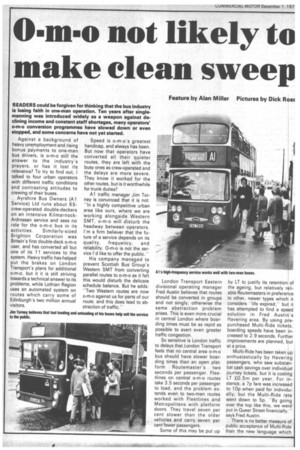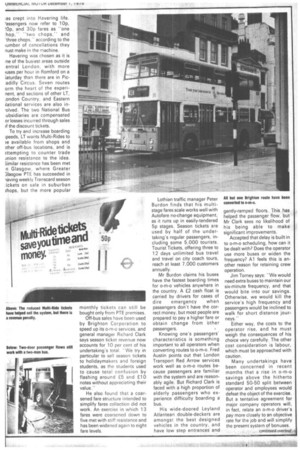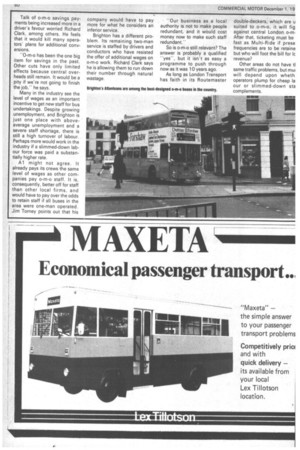O-mie not likely to make clean sweep
Page 82

Page 83

Page 84

If you've noticed an error in this article please click here to report it so we can fix it.
Feature by Alan Millar Pictures by Dick Ross
READERS could be forgiven for thinking that the bus industry is losing faith in one-man operation. Ten years after singlemanning was introduced widely as a weapon against declining income and constant staff shortages, many operators' o-m-o conversion programmes have slowed down or even stopped, and some concerns have not yet started.
Against a background of heavy unemployment and rising bonus payments to one-man bus drivers, is o-m-o still the answer to the industry's prayers, or has it lost its relevance? To try to find out, I talked to four urban operators with different traffic conditions and contrasting attitudes to crewing of their buses.
Ayrshire Bus Owners (Al Service) Ltd runs about 6 5crew-operated double-deckers on an intensive KilmarnockArdrossan service and sees no role for the o-m-o bus in its activities. Similarly-sized Brighton Corporation was Britain's first double-deck o-m-o user, and has converted all but one of its 11 services to the system. Heavy traffic has helped put the brakes on London Transport's plans for additional o-m-o, but it it is still striving towards a technical answer to its problems, while Lothian Region uses an automated system on routes which carry some of Edinburgh's two million annual visitors. Speed is o-m-o's greatest handicap, and always has been. But now that operators have converted all their quieter routes, they are left with the busy ones as crew-operated and the delays are more severe. They know it worked for the other routes, but is it worthwhile for trunk duties?
Al traffic manager Jim Torney is convinced that it is not. "In a highly competitive urban area like ours, where we are working alongside Western SMT, o-m-o will disturb the headway between operators. I'm a firm believer that the future of a service depends on its quality, frequency, and reliability. 0-m-o is not the service I'd like to offer the public."
His company managed to prevent Scottish Bus Group's Western SMT from converting parallel routes to o-m-o as it felt this would disturb the delicate schedule balance. But he adds: "Two Western routes are now o-m-o against us for parts of our route, and this does lead to abstraction of traffic." London Transport Eastern divisional operating manager Fred Austin believes that routes should be converted in groups and not singly, otherwise the same abstraction problem arises. This is even more crucial in central London where boarding times must be as rapid as possible to avert even greater traffic congestion.
So sensitive is London traffic to delays that London Transport feels that no central area o-m-o bus should have slower boarding times than an open platform Routemaster's two seconds per passenger. Fleetlines on central o-m-o routes take 3.5 seconds per passenger to load, and the problem extends even to two-man routes worked with Fleetlines and Metropolitans with platform doors. They travel seven per cent slower than the older vehicles and carry seven per cent fewer passengers.
Some of this may be put up by LT to justify its retention of the ageing, but relatively reliable Routemasters in preference to other, newer types which it considers "life expired," but it has attempted to find a speed solution in Fred Austin's Havering area. By using prepurchased Multi-Ride tickets, boarding speeds have been increased to 2.9 seconds. Further improvements are planned, but at a price.
Multi-Ride has been taken up enthusiastically by Havering passengers, who saw substantial cash savings over individual journey tickets, but it is costing LT £0.5m per year. For instance, a 7p fare was increased to 10p when paid for individually, but the Multi-Ride rate went down to 5p. "By going over the top like this, we were put in Queer Street financially," says Fred Austin.
There is no better measure of public acceptance of Multi-Ride than the new language which
as crept into Havering life. 'assengers now refer to 10p, !Op, and 30p fares as one hop," "two chops," and 'three chops," according to the lumber of cancellations they oust make in the machine.
Havering was chosen as it is ine of the busiest areas outside .entral London, with more Rises per hour in Romford on a iaturday than there are in Pic:adi.11y Circus. Seven routes orm the heart of the experinent, and sections of other LT, .ondon Country, and Eastern 4ational services are also inrolved. The two National Bus iubsidiaries are compensated or losses incurred through sales if the discount tickets.
To try and increase boarding ipeeds, LT wants Multi-Rides to ae available from shops and ather off-bus locations, and is attempting to counter trade inion resistance to the idea. 3imilar resistance has been met n Glasgow, where Greater 3Iasgow PTE has succeeded in laving weekly Transcard season :ickets on sale in suburban ;hops, but the more popular monthly tickets can still be bought only from PTE premises.
Off-bus sales have been used by Brighton Corporation to speed up its o-m-o services, and general manager Richard Clark says season ticket revenue now accounts for 10 per cent of his undertaking's total. "We try in particular to sell season tickets to holidaymakers and foreign students, as the students used to cause total confusion by flashing around £5 and £10 notes without appreciating their
He alsolound that a coarsened.fare structure intended to simplify fares collection did not work. An exercise in which 13 fares were coarsened down to five met with stiff resistance and has been widened again to eight fare levels. Lothian traffic manager Peter Burdon finds that his multistage fares scale works well with Autofare no-change equipment, as it runs up in easily-tendered 5p stages. Season tickets are used by half of the undertaking's regular passengers, including some 5,000 tourists. Tourist Tickets, offering three to 12 days unlimited bus travel and travel on city coach tours, reach at least 7,000 customers annually.
Mr Burdon claims his buses have the fastest boarding times for o-m-o vehicles anywhere in the country. A £2 cash float is carried by drivers for cases of dire emergency when passengers don't have the correct money, but most people are prepared to pay a higher fare or obtain change from 'other passengers.
Knowing one's passengers' characteristics is something important to all operators when converting routes to o-m-o. Fred Austin points out that London Transport Red Arrow services work well as o-m-o routes because passengers are familiar with the system and are reasonably agile. But Richard Clark is faced with a high proportion of elderly passengers who experience difficulty boarding a bus.
His v+iide-doored Leyland Atlantean double-deckers are amongst the best designed vehicles in the country, and have low step entrances and gently-ramped floors. This has helped the passenger flow, but Mr Clark sees no likelihood of his being able to make significant improvements.
Accepted that delay is built in to o-m-o scheduling, how can it be dealt with? Does the operator use more buses or widen the frequency? Al feels this is another reason for retaining crew operation.
Jim Torney says: "We would need extra buses to maintain our six-minute frequency, and that would bite into our savings. Otherwise, we would kill the service's high frequency and passengers would be inclined to walk for short distance journeys."
Either way, the costs to the operator rise, and he must weigh the consequences of his choice very carefully. The other cost consideration is labour, which must be approached with caution.
Many undertakings have been concerned in recent months that a rise in o-m-o savings above the hitherto standard 50-50 split between operator and employees would defeat the object of the exercise. But a tentative agreement for major company operators wig, in fact, relate an o-m-o driver's pay more closely to an objective rate for the job and will simplify the present system of bonuses. Talk of o-m-o savings payments being increased more in a driver's favour worried Richard Clark, among others. He feels that it would kill many operators plans for additional conversions.
"O-m-o has been the one big item for savings in the past. Other cuts have only limited effects because central overheads still remain. It would be a pity if were not going to finish the job, ' he says.
Many in the industry see the level of wages as an important incentive to get new staff for bus undertakings. Despite growing unemployment, and Brighton is just one place with aboveaverage unemployment and a severe staff shortage, there is still a high turnover of labour. Perhaps more would work in the industry if a slimmed-down labour force was paid a substantially higher rate.
Al might not agree. It already pays its crews the same level of wages as other companies pay o-m-o staff. It is, consequently, better off for staff than other local firms, and would have to pay over the odds to retain staff if all buses in the area were one-man operated. Jim Torney points out that his company would have to pay more for what he considers an inferior service.
Brighton has a different problem. Its remaining two-man service is staffed by drivers and conductors who have resisted the offer of additional wages on o-m-o work. Richard Clark says he is allowing them to run down their number through natural wastage. "Our business as a local authority is not to make people redundant, and it would cost money now to make such staff redundant."
So is o-m-o still relevant? The answer is probably a qualified ''yes'S, but it isn't as easy a programme to push through now as it was 10 years ago.
As long as London Transport has faith in its Routemaster double-deckers, which are u suited to o-m-o, it will fig against central London o-mAfter that, ticketing must be fast as Multi-Ride if prese frequencies are to be retaine but who will foot the bill for lc revenue?
Other areas do not have tl same traffic problems, but mui will depend upon wheth operators plump for cheap la our or slimmed-down sta complements.


































































































































